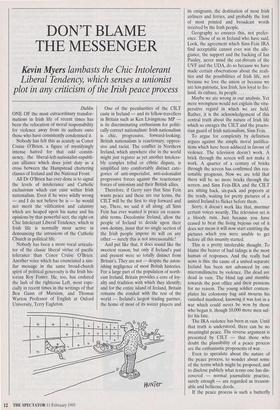DON'T BLAME THE MESSENGER
Kevin Myers lambasts the Chic Intolerant
Liberal Tendency, which senses a unionist plot in any criticism of the Irish peace process
Dublin ONE OF the most extraordinary transfor- mations in Irish life of recent times has been the relocation of moral responsibility for violence away from its authors onto those who have consistently condemned it.
Nobody has felt this as acutely as Conor Cruise O'Brien, a figure of mystifyingly intense hatred for that odd constit- uency, the liberal-left-nationalist-republi- can alliance which does joint duty as a cross between the Hampstead chattering classes of Ireland and the National Front.
All Dr O'Brien has ever done is to signal the levels of intolerance and Catholic exclusivism which can exist within Irish nationalism. Even if he were wildly wrong — and I do not believe he is — he would not merit the vilification and calumny which are heaped upon his name and his opinions by that powerful sect, the right-on Chic Intolerant Liberal Tendency, which in Irish life is normally most active in denouncing the intrusions of the Catholic Church in political life.
Nobody has been a more vocal articula- tor of the classic liberal virtue of pacific tolerance than Conor Cruise O'Brien. Another voice which has enunciated a sim- ilar message in the same broad-church spirit of political generosity is the Irish his- torian Roy Foster. He, too, has endured the lash of the righteous Left, most espe- daily in recent times in the writings of that Ben Gunn of Marxism, and Thomas Warton Professor of English at Oxford University, Terry Eagleton. One of the peculiarities of the CILT caste in Ireland — and its fellow-travellers in Britain such as Ken Livingstone MP is its discriminating enthusiasm for politi- cally correct nationalism: Irish nationalism is chic, progressive, forward-looking; British nationalism is reactionary, oppres- sive and racist. The conflict in Northern Ireland, which anywhere else in the world might just register as yet another intolera- bly complex tribal or ethnic dispute, is simplified into comfortably distinct cate- gories of anti-imperialist, anti-colonialist progressive forces against the reactionary forces of unionism and their British allies.
Therefore, if Gerry says that Sinn Fein wants peace and these are our terms, the CILT will be the first to step forward and say, There, we said it all along: all Sinn Fein has ever wanted is peace on reason- able terms. Decolonise Ireland, allow the people of Ireland to decide upon their own destiny, insist that no single section of the Irish people impose its will on any other — surely this is not unreasonable?
And put like that, it does sound like the sweetest reason; but only if Ireland's past and present were so totally distinct from Britain's. They are not — despite the aston- ishing negligence of most British histories. For a large part of the population of north- east Ireland, Britain provides a core of loy- alty and tradition with which they identify; and for the entire island of Ireland, Britain remains the conduit with the rest of the world — Ireland's largest trading partner, the home of most of its soccer players and its emigrants, the destination of most Irish airliners and ferries, and probably the font of most printed and broadcast words received by the Irish people.
Geography so ensures this, not prefer- ence. Those of us in Ireland who have said, Look, the agreement which Sinn-Fein IRA find acceptable cannot ever win the alle- giance, the support and the backing of Ian Paisley, never mind the cut-throats of the UVF and the UDA, do so because we have made certain observations about the reali- ties and the possibilities of Irish life, not because we love the union or because we are less patriotic, less Irish, less loyal to Ire- land, its culture, its people . .
Maybe we are wrong in our analysis. Yet mere wrongness would not explain the vitu- perative regard in which we are held. Rather, it is the acknowledgement of this central truth about the nature of Irish life which so enrages the CILT and the praeto- rian guard of Irish nationalism, Sinn Fein.
To argue for complexity by definition argues against the simple moral justifica- tions which have been adduced in favour of violence. The television doesn't work. A brick through the screen will not make it work. A quarter of a century of bricks through the screen has confirmed this rea- sonable prognosis. Now we are told that there will be no more bricks through the screen, and Sinn Fein-IRA and the CILT are sitting back, six-pack and popcorn at the ready, waiting for pretty pictures of a united Ireland to flicker before them.
Sorry, it doesn't work like that, murmur certain voices wearily. The television set is a bloody ruin. Just because you have ceased to beat the living bejesus out of it does not mean it will now start emitting the pictures which you were unable to get before all this insanity started.
This is a pretty intolerable thought. To blame the bearer of bad tidings is the most human of responses. And the really bad news is this: the cause of a united separate Ireland has been not advanced by one micromillimetre by violence. The dead are dead in vain. The blind tap and stumble towards the post office and their pensions for no reason. The young soldier contem- plates his colostomy bag and mourns his vanished manhood, knowing it was lost in a war which could never be won by those who began it, though 10,000 more men suf- fer his fate.
The IRA violence has been in vain. Until that truth is understood, there can be no meaningful peace. The reverse argument is presented by CILT — that those who doubt the plausibility of a peace process are the enthusiastic proponents of war.
Even to speculate about the nature of the peace process, to wonder about some of the terms which might be proposed, and to disclose publicly what terms one has dis- covered — normal journalistic practice, surely enough — are regarded as treason- able and bellicose deeds.
If the peace process is such a butterfly
that it cannot withstand the buffeting caused by imagination and by lurid or igno- rant enquiry or even by tendentious partial disclosure — which is how the Times' reports last week are regarded by national- ist Ireland: for the sake of argument let us accept that judgment — it will hardly with- stand the rude inspection which awaits it in the treeless and war-muralled estates of west Belfast and the picturesque culvert- lands of South Armagh.
The most interesting feature of the Times' story — a partial leak of the framework doc- ument drawn up by British and Irish civil servants — was not what it said, but the response it evoked amongst those who have maintained that the peace process proceeds. It was to denounce the leak as the playing of the Orange card and the Times as the play- thing of unionism; and when John Major tried to reassure Northern Ireland council leaders about the framework proposals, Gerry Adams dismissed the meeting as 'an Orange tea party'.
What is this? Even before the first invita- tions to talks are written, the president of Sinn Fein is trading in this kind of brisk sectarian abuse? Is this what our future is to be built on?
Those who doubt are now being blamed. It is a form of moral blackmail. If you doubt, you want war.
My heart is sick with war; yet what else can there be but doubt when one hears the actual language of Sinn Fein? Listen to Gerry Adams's latest interview in the Irish Times this week Question: Falling short of achieving your goal of unity now, what transitional arrangements do you envisage?
Answer: We believe that Dublin and London should come to an agreement to replace the British jurisdiction with a new agreed Irish jurisdiction. We are not necessarily seeking Dublin rule. We are looking for a new agreed Ireland, a government of the entire country . . . a transformation of Irish society. We want to see an Irish republic.
And that is Mr Adams's transitional aspi- ration? He did not mention nice fisheries boards, or joint tourism ventures, or shared electricity: his interim ambition is an agreed Ireland. Aye, and oil in County Roscommon, and diamonds in Fer- managh .
Question: What about the unionists' attitude to a settlement?
Answer.• I have a view that the unionists will only seek to make agreement with the rest of the people of this island when the British Government points them in that direction.
What? All that is required is for the British Government to tell those nice, obe- dient, biddable unionists what to do next, and they'll do it? Good heavens above. Why didn't anyone think of this before?
Kevin Myers is a columnist on the Irish Times.



























































 Previous page
Previous page